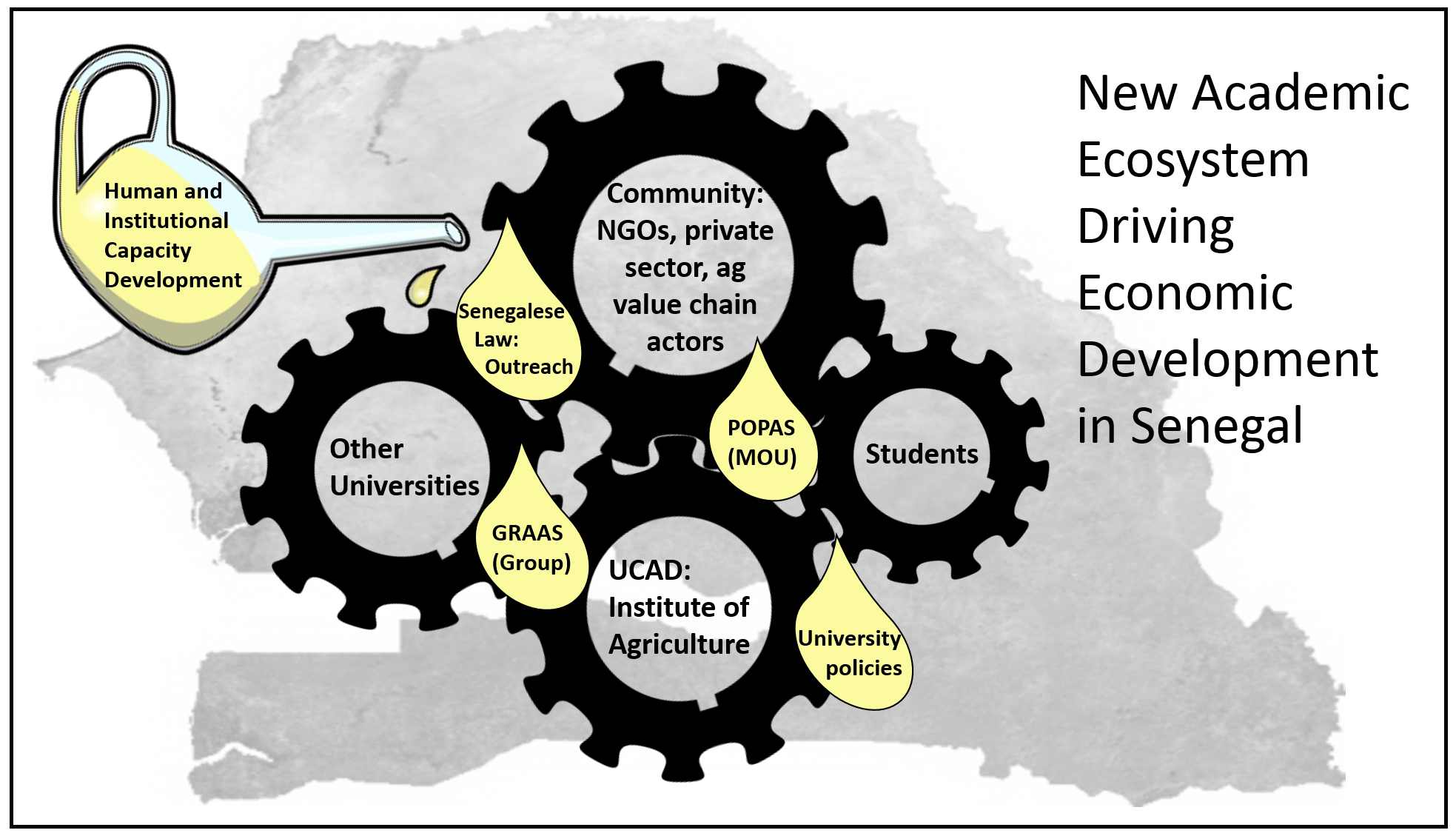Kandioura Noba, Larry Vaughan and Irene Annor-Frempong
Edited by Keith M. Moore
A recent law in Senegal challenges its universities to contribute to the country’s development by establishing an outreach mission. Even prior to this law, the Université Cheikh Anta Diop de Dakar (UCAD) was growing beyond its traditional academic missions to build an agricultural science program contributing to sustained economic development. The new law challenges UCAD and the other higher education institutions of Senegal to engage in community development beyond their historic missions of teaching and research. New behaviors will be required. For a faculty to become effective community servants and contribute to economic development, it must build productive relationships with the private sector, professional associations, other universities, university administration, government ministries, etc. This service mindset involves a major re-orientation of traditional university practice. For relationships to be meaningful on each of these levels involves sharing decision-making in the conception and execution of curriculum, research, and outreach activities.

UCAD is far from being the only source of agricultural knowledge and learning in Senegal. Coordination with other universities is important because not every needed expertise for a project resides in the same institution. For universities in developing economies to effectively contribute to economic development in agriculture, they need to develop relationships with the private sector, NGOs, agricultural producers, and other value chain actors. Because a university’s first job is educating students and because students become the entrepreneurs and employees operating within a transforming economy, aligning outreach and education economy helps a university remain relevant to national development objectives.
Universities and business have not had a long history of collaboration in Senegal. Professors have difficulty communicating with the private sector. Likewise, business leaders may not see the relevance in reaching out to professors. Making this effort will have an impact on student employment and economic growth in the sector in two ways. Private sector relationships create opportunities for student internships. Knowledge of the private sector by faculty members as well as the direct sharing of perspectives and ideas by the private sector leads to curriculum revision. Furthermore, these relationships provide a pathway for the curriculum to remain lively and relevant to students and employers.
The departments and institutes within UCAD have worked together with USAID support to strengthen outreach with small businesses. Relations with the private sector were first secured through a memorandum of understanding between the university and a professional organization of small-scale, women-owned food processors named POPAS. The university provides training to entrepreneurs and POPAS hosts student internships. To strengthen UCAD’s ability to collaborate across departments and disciplines, the university is developing an institute of agriculture. At the national level, UCAD and other universities are members of an inter-ministerial, private/public sector forum focused on identification and discussion of priority issues in agricultural education. Known as GRAAS from its French abbreviation, it offers a unique space for dialogue between representatives from farmer associations, agribusiness, universities, agricultural technical schools, and government.
In our opinion, an institution that is consistently and broadly committed internally in promoting an engagement mission and increasing support to economic development in private sector creates for itself a landscape full of opportunity for recognition and conducive to government and donor support.
This model strengthens the research-outreach-education triangle through linkages with the community, creating an ecosystem for science-led economic development. In the process, new knowledge and practices are created within the university, transforming faculty and students into community servants and the university into a vital driver of economic development in Senegal.


It would seem that institutions such as UCAD are at least doubly challenged when it comes to increasing their level of outreach activity. Given the history of focus on teaching and research, a concentration on outreach would require a change in “mind set” of staff and administrators. Ideally, this would be facilitated by changes in the norms and official policies which guide UCAD’s daily operations as well as staff performance evaluation. Staff would need to be rewarded for this activity. Changes in this normative structure will eventually need to be approved by governing entities.
The tremendous increases in student numbers experienced by UCAD over the past several decades make it particularly difficult for staff to focus on outreach activities. Thus, new additional resources may be required to address this new dimension of activity, and that some of these resources may need to be allocated for staff hiring for this purpose.